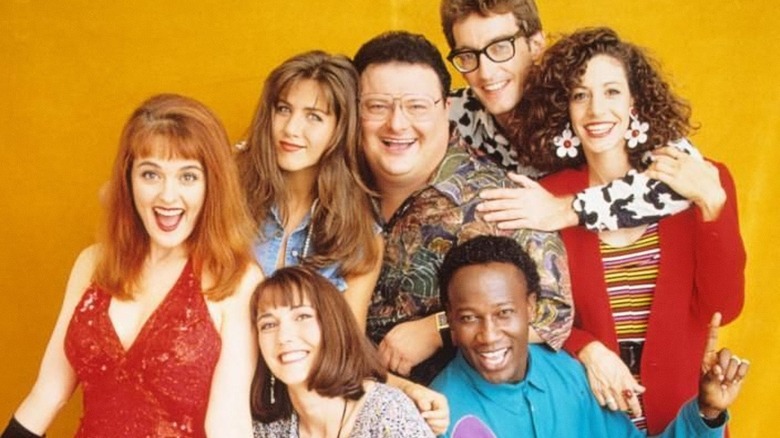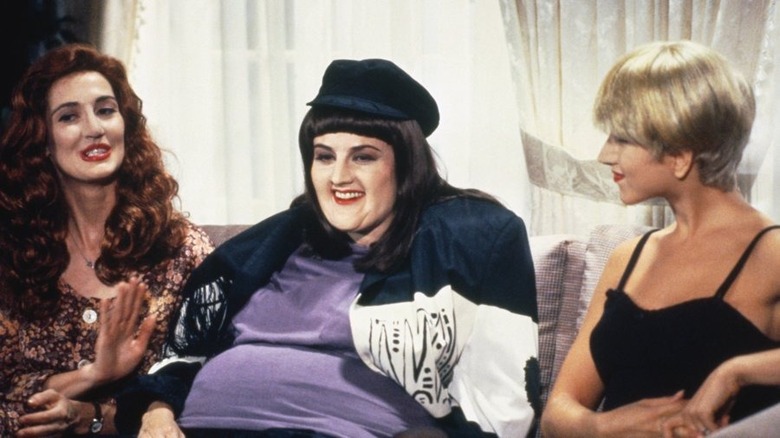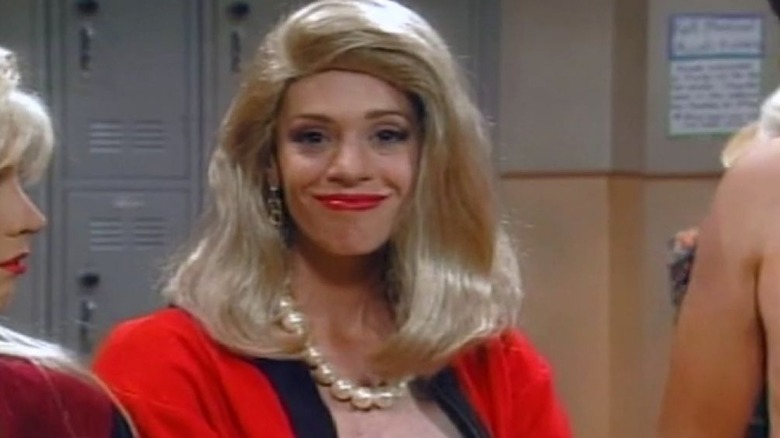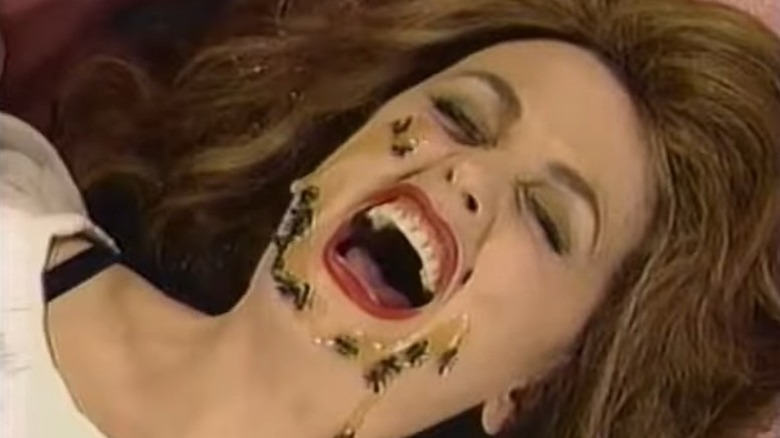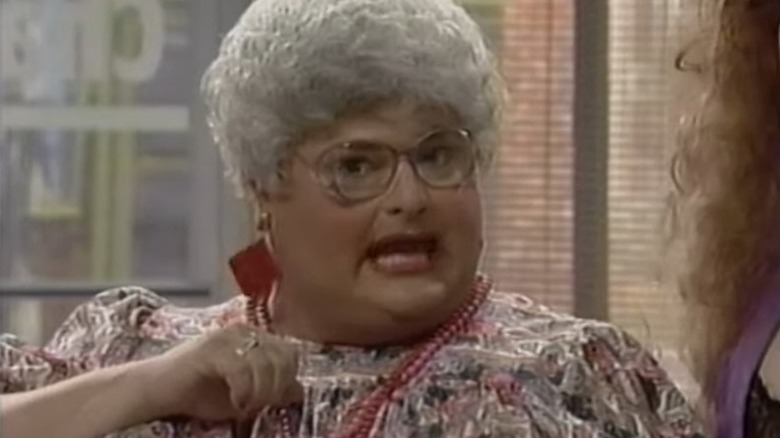TV, Interrupted: The Edge Was The Most Violent Sketch Comedy Show Ever Made
(Welcome to TV, Interrupted, a series where the /Film team remembers, eulogizes, and makes a case for the revival of TV shows we loved that were canceled far too soon.)
Comedian and actress Julie Brown (not to be confused with the "Downtown" variety) began her career working the standup circuit and appearing in bit parts in films like "Any Which Way You Can" and "Bloody Birthday" before releasing her 1984 EP "Goddess in Progress" through Rhino Records, the world's best record label. The songs "Earth Girls Are Easy," "'Cause I'm a Blonde," "I Like 'Em Big and Stupid," and the (now, no longer funny) "The Homecoming Queen's Got a Gun" were all hits in novelty music circles, and Brown's career soon expanded to include TV shows and movies she would write and produce herself. Brown adapted her song "Earth Girls Are Easy" into a 1988 feature film of the same, starring Geena Davis and Jeff Goldblum, and soon thereafter entered the world of TV, making two ill-fated pilots ("The Julie Show" and "Julie Brown: The Show").
Brown always played outsize, clueless characters, often as sendups of the ultra-vapid fame culture of the late 1980s and early 1990s, frequently poking fun at beauty standards and body image; Brown was often seen making fun of supermodels and frequently wore fat suits to parlay her satires.
In 1992, Brown starred in her own sketch comedy show (created and largely directed by showrunner David Mirkin) for Fox, fittingly called "The Edge," wherein she could explore her penchant for crass satire, violent tendencies, and, and penchant for bloody, slapstick death. Did I mention the violent tendencies? Golly, was the show violent. And funny. Violently funny. This was a show where the entire cast would be killed on camera at the start of every episode.
Why The Edge was great
Any mention of "The Edge" in 2022 will first make mention of its cast of then up-and-comers who would go on to larger hit projects. Jennifer Aniston ("Friends") was among the main cast, as was Wayne Knight ("Seinfeld") and Tom Kenny (SpongeBob himself). Also on the main cast were Carol Rosenthal, James Stephens III, and Jill Talley. Paul Feig and Alan Ruck appeared in a few episodes, and animated bumpers in between sketches were provided by star animator Bill Plympton.
"The Edge" was sick, and that is a high compliment. Almost every single one of its sketches ended in death or violence. Buckets of blood were spilled and guns were frequently fired; one of the show's more notable segments was "Armed Family," a sitcom spoof wherein every character was disastrously trigger happy. In one of the cast-killing opening sequences, the comedians were shot up with arrows. In another, the cast was run down by a truck. In another still, an enormous blade decapitated them all in one grand swing. "The Edge" took place in a universe wherein Jennifer Aniston would incur mockery from her co-stars upon revealing that her bowling ball bag contained a nothing more than a mere bowling ball. Everyone else carries bloody severed human heads in theirs. "Come back! There's blood on it!" she shouted after them.
Brown also featured multiple send-ups of the way women's bodies were objectified by the media, and a running gag featured models in bikinis leaping on camera at the end of a sketch, accompanied by the on-screen caption "SWEEPS WEEK." What better way to bolster ratings than models in bikinis?
There is too much additional greatness to relate here. Seek clips on YouTube for more.
Why The Edge was canceled
While "The Edge" garnered "respectable" ratings, it was never the runaway success of, say, "In Loving Color" or the equally dark "Kids in the Hall." It was, perhaps, too madcap for fans of dark humor, and too violent for fans of slapstick. The show had a breakneck pace, and could only be appreciated by easily amused serial killers or overcaffeinated ninth graders (I was the latter). "The Edge" was in keeping with certain humor trends at the time. Shows like "Married... with Children" and "The Simpsons" pushed mainstream comedy toward genre deconstruction and the dysfunction hidden within old sitcom tropes. "The Edge" merely pointed out that slapstick violence, when taken to an extreme, becomes even more absurd. It was a media commentary posing as a gore-soaked farce.
The show's tone was also decidedly wicked; when "The Edge" satirized a hot TV show, it pulled no punches, often pointing out the show's most glaring weaknesses openly. Indeed, Julie Brown's spoof of "Beverly Hills 90210" got "The Edge" in hot water with no one less than Aaron Spelling, the "90210" producer. On "The Edge," the character of Donna, played by Spelling's daughter Tori on "90210," frequently turned to the camera saying that she was allowed to do whatever she wanted because it's "my daddy's show." This, mixed in with scenes of the characters engaging in incest, led to Spelling demanding an apology. David Mirkin, producer on "The Edge," stood by the show's writers (which included future Oscar winner Charlie Kaufman) and was quoted in the Los Angeles Times as saying, "What's upsetting to me is it shows absolutely that Mr. Spelling has no sense of humor."
Low ratings, an angry Spelling, and a weird, weird tone led to the demise of "The Edge" after only 18 episodes.
Unfinished Business
Given the above-mentioned 1990s media ethos of deconstructionist entertainment — heck, even "Tiny Toon Adventures" regularly broke the fourth wall — one would assume a deconstructionist sketch comedy show like "The Edge" would have taken hold more strongly in the popular consciousness. The "old world" of TV comedy was evolving in the 1990s. Jay Leno and David Letterman had only just recently had a rivalry over who would get to host "The Tonight Show" (Leno took over the gig in March of '92), leading to discussions as to whether or not that Boomer-ready format of comedy was even worth preserving. Keenan Ivory Wayans had already pushed sketch comedy onto a new plane (seriously, why is "Saturday Night Live" still a thing?) and there was no reason why continued absurdity and self-aware violence should not have caught on within the genre.
Of course, the greatest sketch comedy shows rarely last longer than a few seasons, as each of them were products of their time. "Monty Python's Flying Circus" only lasted four seasons. "The State" also only lasted a few years. "In Living Color" lasted five. "Kids in the Hall" also lasted five years, but they have reunited incessantly. "SCTV," six years. Ditto, "Laugh-In." After five years, maybe six, any good sketch comedy show will begin to peter out. "MADtv" lost its luster pretty quickly, and "SNL" has always been 15% good sketches surrounded by filler that seems to last for hours. The notable exception to this rule is probably "You Can't Do That on Television," which last 10 years and was strong throughout.
Perhaps there wasn't a lengthy future for "The Edge," as great sketch comedy cannot last. But surely it deserved at least another year or two.
Will The Edge ever return?
Unlike "Kids in the Hall" or "The State" or many of its contemporaries, "The Edge" never garnered much of a cult audience. Apart from its notable cast, few characters or one-liners from the show leaked into the pop consciousness, and the troupe's individual works — at least in the cases of Knight, Aniston, and Kenny — eclipsed whatever clout "The Edge" might have had ... if any.
The show's credited creator, Mirkin, went on to be the showrunner on "The Simpsons" in its sixth season, and is on record for having left "The Edge" over budget concerns. Mirkin's butting of heads with Spelling and leaving the show in its first season left something of a stink on it, and "The Edge" has been difficult to find ever since (it's not on any streaming services). It was only in recent years that Brown, who seemingly holds the rights to the show, began been offering DVDs through her website. Profits go straight to Brown.
I encourage you to buy the DVDs.
But in brief, there is no way in Hades that "The Edge" will return. The stars and producer all went on to more popular things in spite of "The Edge" and not necessarily because of it. But one can say categorically that it is certainly the best thing that the cast has ever done; an episode of "The Edge" will provide twice as many incredulous laughs as "Seinfeld" or "Friends." Perhaps I just tipped my hand as to my comedic tastes.
"The Edge" remains something of an obscurity and perhaps is destined to remain so for the immediate future. But one can take comfort in the fact that the right people will eventually find it, understand what it was doing, and unlock one of the finest, darkest, most violent sketch comedy shows ever made.
